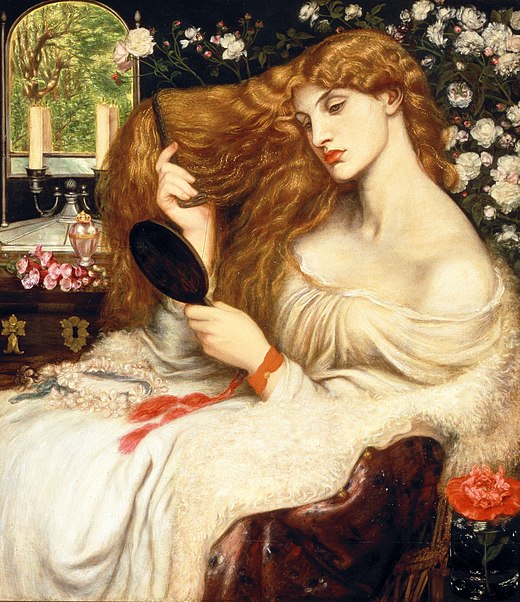America?
 |
| Rossetti, Dante Gabriel. Lady Lilith. 1866. Bancroft Collecion. Wikimedia Commons. 28 Oct. 2013. Web. 13 Aug. 2014. |
Etymology
The name comes from the semetic root L-Y-L layil in Hebrew, which comes from layl in Arabic, meaning "night". The words for "spirit" are lili and līlīu in Akkadian. Although the Akkadian lilu means "evening", it has no etymologic relationship to lili, Sumerian for she-devils. Charles Fossy states that לילית literally translates to "female night being/demon".
The first identified use of Lilith is in the Epic of Gilgamesh written about 600 B.C. Samuel Noah Cramer translated ki-sikil-lil-la-ke as Lilith in "Tablet XII". However, "Tablet XII" is not part of the original Epic of Gilgamesh but is a later Akkadian translation of Bilgames and the Netherworld, a Sumerian poem. The serpent and the zu bird are associated with the ki-sikil-lil-la-ke. Lilith also occurs in the Bible, in the Book of Isaiah. The word lilit or lilith is listed as one of the eight unclean animals. The Greek translate the word as onokentauros (onocentaur), and 5th-century Vulgate translate the word as lamia.
According to Medieval Jewish folklore, Lilith was the first wife of Adam but was soon rejected after refusing to obey him. She was then turned into a night demon.
Lilith first appeared in romantic literature in Faust: The First Part of the Tragedy (1808) by Goethe. Inspired by his work, the Pre-Raphaelite Brotherhood drew on Goethe's Lilith. In 1863, Dante Gabriel Rossetti began painting his rendition of Lady Lilith. Symbols in the painting do allude to her femme fatale disposition, such as poppies and white roses. Rossetti also wrote a sonnet entitled Lilith. In 1881, the sonnet was renamed Body's Beauty.
Namesakes
Other famous bearers of this name include Scarlet Lilith Eleida Page, daughter of Jimmy Page, and numerous characters on TV series that feature demons, vampires, or other frightening creatures.
Currently at #826, the name Lilith has not been in the Top 1000 long, only appearing in 2010 at #994, barely scrapping past the marking point. Seen as naming your son Lucifer in many countries, the name Lilith is not common in the Anglophone world.
Nickname Options:
Lily, a floral name that's had a longer use in America and is now the highest its ever been. Popularly used in the nineteenth century, Lily lost popularity in the 1940s, '50s, '60s, '70s, and '80s, but has slowly been gaining a following. The name is also quite popular in England, Wales, Scotland, and Ireland, according to their top charts in 2012. Seemingly in the opposite direction of demonic, lily is the symbol of purity and innocence and plays a role in Christian imagery. There are many more namesakes for Lily, including Lily Allen, an English singer, Lily Rabe, an American actress, and Lily Tomlin. There's also variants of Lily that could work just as well: Lys, Lili, and Li.People who like Lilith also like...
Lucifer, Narcissus, Salem, Vlad, Morgana, Circe, Jezebel, LolitaGothic or not, this name is sure to give you the chills. Obscurity and history make their mark on a beautiful name with a soft sound, a lovely nickname, but a harsh reality to the truth behind Lilith's demonic behavior. Can your daughter handle Lilith?
No comments:
Post a Comment